Module 9 Unit 3 Language in use 课件(共34张PPT,内嵌音视频) 2024-2025学年英语外研版九年级上册
文档属性
| 名称 | Module 9 Unit 3 Language in use 课件(共34张PPT,内嵌音视频) 2024-2025学年英语外研版九年级上册 |
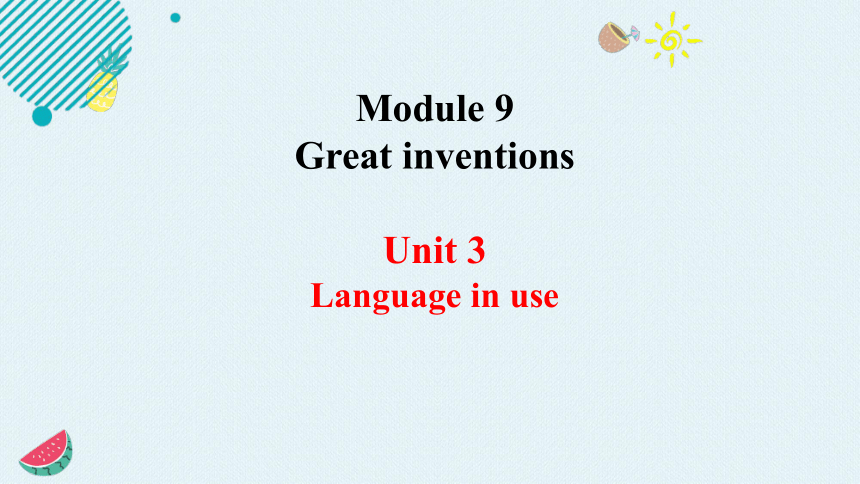
|
|
| 格式 | pptx | ||
| 文件大小 | 15.4MB | ||
| 资源类型 | 教案 | ||
| 版本资源 | 外研版 | ||
| 科目 | 英语 | ||
| 更新时间 | 2024-11-08 00:00:00 | ||
图片预览

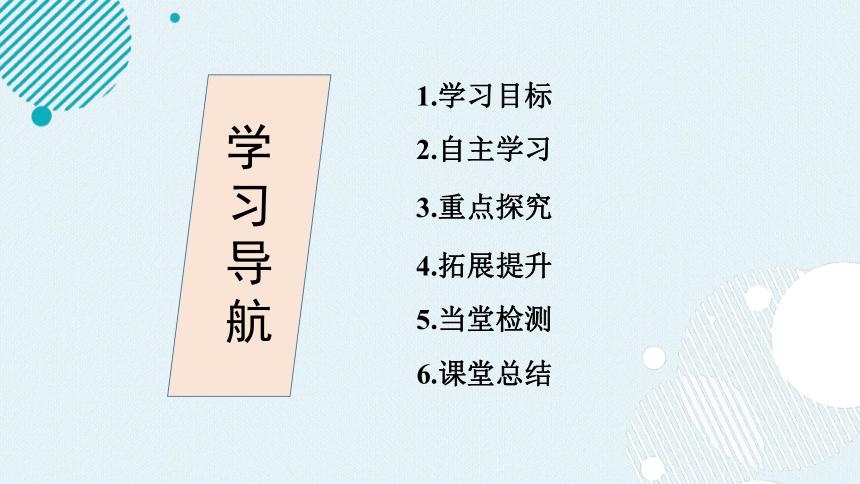
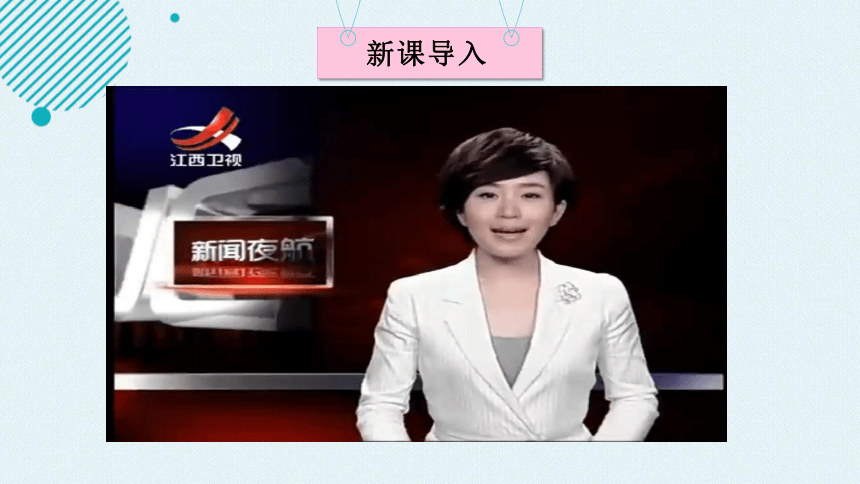
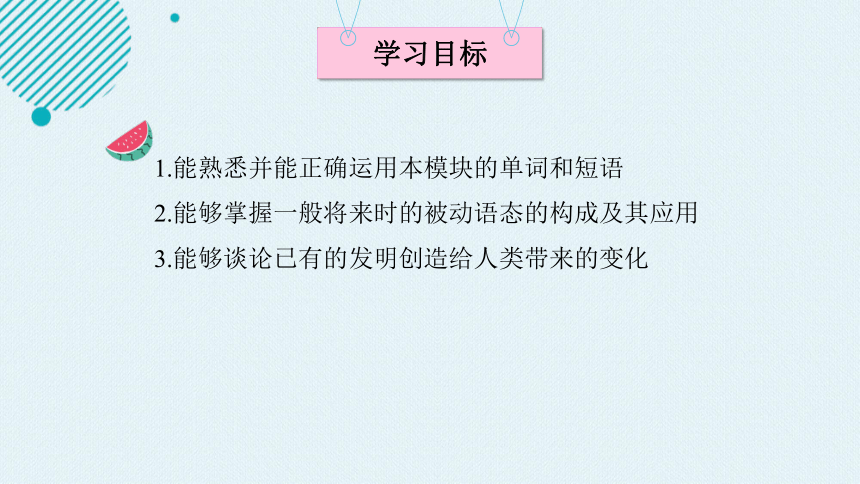
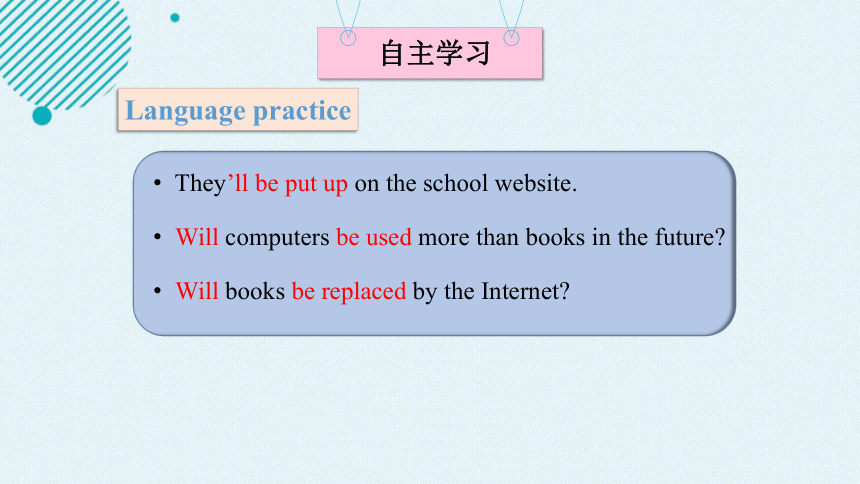
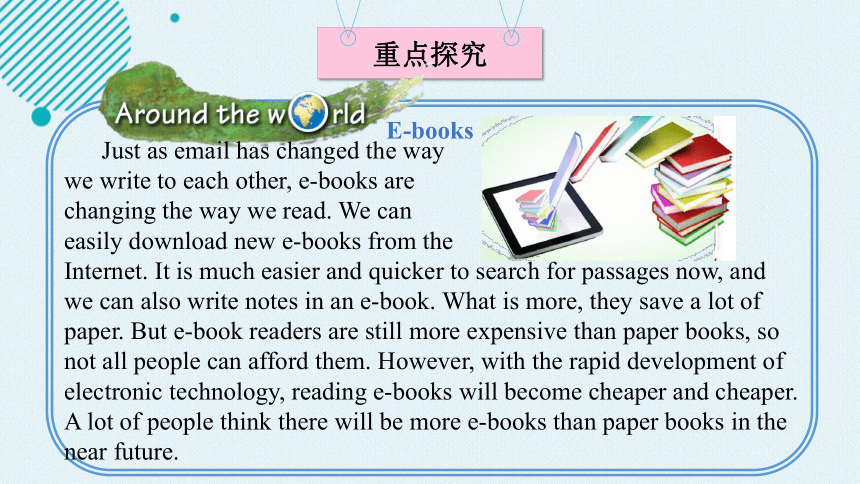
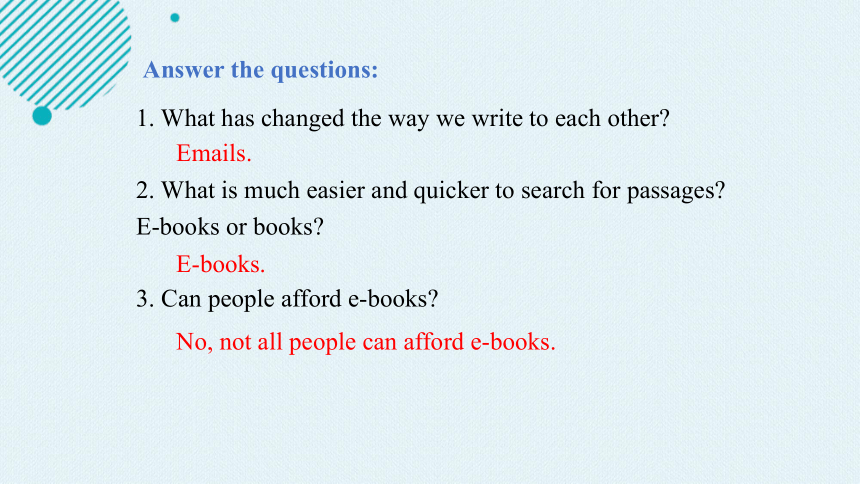

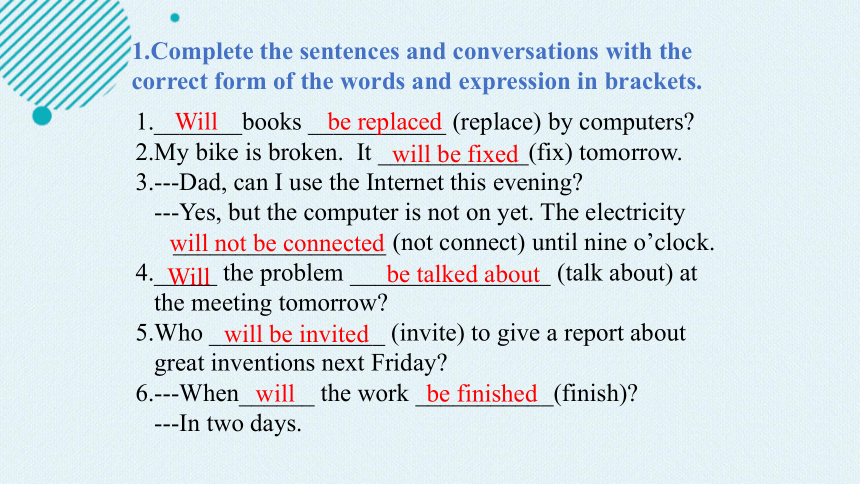
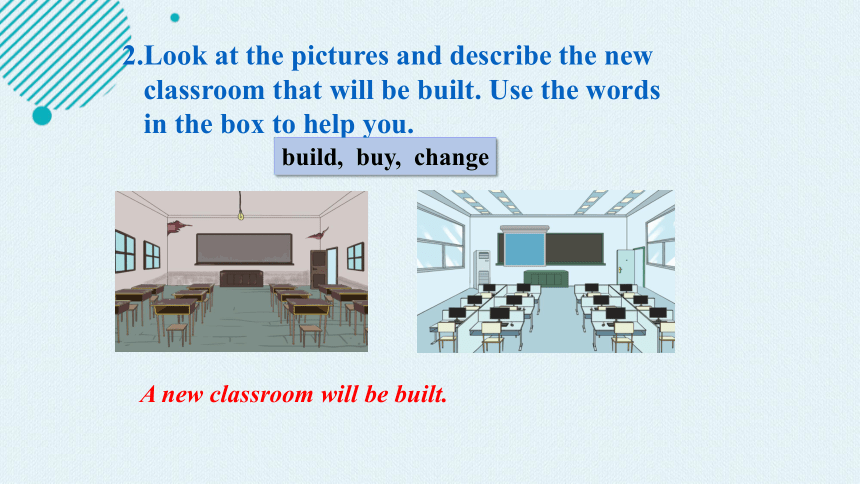
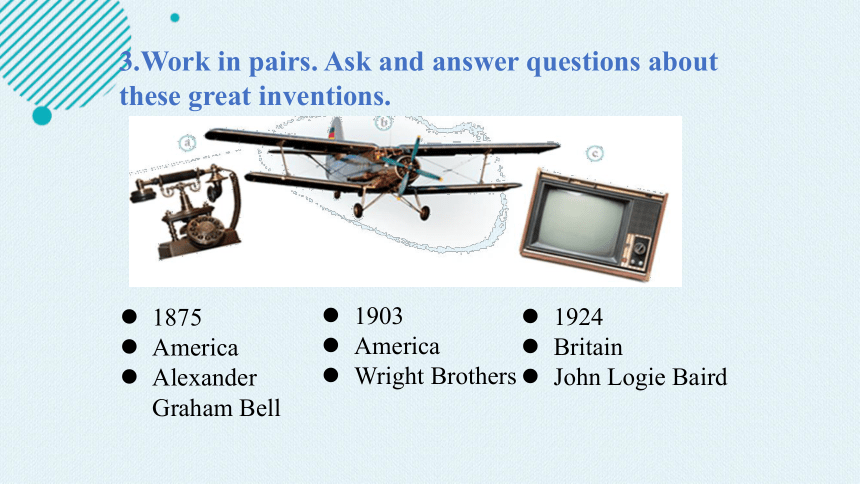

文档简介
(共34张PPT)
Module 9
Great inventions
Unit 3
Language in use
1.学习目标
3.重点探究
2.自主学习
学习导航
5.当堂检测
6.课堂总结
4.拓展提升
新课导入
1.能熟悉并能正确运用本模块的单词和短语
2.能够掌握一般将来时的被动语态的构成及其应用
3.能够谈论已有的发明创造给人类带来的变化
学习目标
自主学习
Language practice
They’ll be put up on the school website.
Will computers be used more than books in the future
Will books be replaced by the Internet
重点探究
Just as email has changed the way
we write to each other, e-books are
changing the way we read. We can
easily download new e-books from the
Internet. It is much easier and quicker to search for passages now, and we can also write notes in an e-book. What is more, they save a lot of paper. But e-book readers are still more expensive than paper books, so not all people can afford them. However, with the rapid development of electronic technology, reading e-books will become cheaper and cheaper. A lot of people think there will be more e-books than paper books in the near future.
E-books
Answer the questions:
1. What has changed the way we write to each other
2. What is much easier and quicker to search for passages E-books or books
3. Can people afford e-books
Emails.
E-books.
No, not all people can afford e-books.
They’ll be put up on the school website.
Will computers be used more than books in the future
Will books be replaced by the Internet
Read the sentences and pay attention to the underlined parts.
1.Complete the sentences and conversations with the correct form of the words and expression in brackets.
1._______books ___________ (replace) by computers
2.My bike is broken. It ____________(fix) tomorrow.
3.---Dad, can I use the Internet this evening
---Yes, but the computer is not on yet. The electricity
_________________ (not connect) until nine o’clock.
4._____ the problem ________________ (talk about) at
the meeting tomorrow
5.Who ______________ (invite) to give a report about
great inventions next Friday
6.---When______ the work ___________(finish)
---In two days.
Will
will be fixed
be replaced
will not be connected
Will
be talked about
will
will be invited
be finished
2.Look at the pictures and describe the new
classroom that will be built. Use the words
in the box to help you.
build, buy, change
A new classroom will be built.
1924
Britain
John Logie Baird
1903
America
Wright Brothers
3.Work in pairs. Ask and answer questions about these great inventions.
1875
America
Alexander Graham Bell
When was the telephone invented
It was invented in 1875.
What kind of telephone do you think will be made in the future
...
1.Before the _____________of printing, few people could read.
2.There were more books to sell, so the ______ in books grew.
3.Because more people could read, ideas________quickly.
4.What _________ will printing take in the future
introduction
trade
spread
direction
4.Complete the sentences with the words
in the box.
direction, introduction, spread, trade
5. Listen and find out where the speaker is.
a) In a school library.
b) In the British Library.
c) In the British Museum.
3.How has the computer helped people read old books
in the British Library
2.Why were many old books copied onto a computer
6. Listen again and answer the questions.
1.Why were so few books produced in ancient times
Because each one was written by hand.
Because old books are too valuable to be picked up
and held on.
You can touch the screen to turn the pages without
touching the real books.
What do you do by the Internet
Discuss:
7.Read the passage and choose the best title.
a) The history of the Internet
b) The World Wide Web
c) The Internet and the Web
d) The future of the Internet
The Internet has been around for many years, but it was the invention of the World Wide Web that made it really useful to people. Together,the Internet and the World Wide Web have changed the world.
The Internet was invented by the US government in the 1960s, for the army to use. In the 1970s,scientists and businesspeople also wanted to use the Internet to send and receive messages. For some years,people could only send very simple texts. They could not send photos or documents by the Internet.
That changed in 1991,when a British scientist named Tim Berners- Lee invented the World Wide Web. The World Wide Web allows people to send various types of files, such as texts, photos and videos by the Internet, so more and more people started to use it in the 1990s.
Today,the Web has hundreds of millions of users. It has changed the way people live, work and play. Through the Internet,email allows us to communicate nearly instantly with people thousands of miles away. People and businesses use e commerce and online shopping to buy and sell things across the world. The Web also makes people's lives easier because now many things can be done from home,twenty-four hours a day.
The Web can help you do research for your homework, so that you do not need to go to the library. You can use Internet banking, instead of going to the bank. And,of course,people just“ surf the Web” when they want to relax.
Technology changes quickly,and it is hard to imagine what the future of the Internet and the Web will be. But it seems impossible to imagine life without them.
Now complete the chart.
The Internet was invented for the army to use.
Scientists and businesspeople wanted to use the Internet to send and receive messages.
The World Wide Web was invented.
More and more people started to use the Internet to send various types of files.
The Web has hundreds of millions of users. It has changed the way people live, work and play.
In 1991
In the 1970s
In the 1960s
In the 1990s
Today
8. Work in groups. Prepare for your discussion.
● Think of an invention that has changed your life.
● Make notes about the invention:
1. What is it
2. Why is it useful
● Research how the invention has been developed and
make notes about what you find out.
It is a machine for…
You can use it to…
9. Discuss with your group.
● Tell your group about your invention.
Ask them for their ideas.
● Make notes about your discussions.
10. Present your findings to the class.
拓展提升
Language points
一般将来时的被动语态
被动语态的动词形式为:be+动词的过去分词,其中be为助动词,根据不同的人称和时态有形式的变化。一般将来时的被动语态中be动词为shall/will be。(shall 用于第一人称;will用于各种人称)
一般将来时的被动语态的结构:
1.肯定句: 主语+shall/will be+过去分词+(by...)
e.g.
We shall be punished if we break the rules.
如果我们违反规定,我们将要受到惩罚。
The new film will be shown next Thursday.
这部新电影将在下周四上映。
2.否定句: 主语+shall/will not be+过去分词+(by...)
注:shall not可缩写为shan't,will not可缩写为won't
eg.
We shan't be punished if we don't break the rules.
如果我们不违反规定,我们将不会受到惩罚。
The new film won't be shown next Thursday.
这部新电影将不会在下周四上映。
3.一般疑问句:Shall/will+主语+be+过去分词+(by...)
eg. Shall we be punished if we break the rules
如果我们违反规定,我们将要受到惩罚吗?
Yes, you will./ No, you won't.
是的,你们会。/ 不,你们不会。
Will the new film be shown next Thursday
这部新电影将在下周四上映吗?
Yes, it will./ No, it won't.
是的,它会。 / 不,它不会。
4.特殊疑问句: 特殊疑问词+shall/will+主语+be+过去分词+(by...)
eg.
What shall we be done if we break the rules?
如果我们违反规定,我们将会怎样?
When will the new film be shown
这部新电影将会在什么时候上映?
1. 肯定句形式:
主语+will/be(am/is/are)going to+be+动词过去分词
2. 否定句形式:
主语+will not/be(am/is/are)not going to+be+动词过去分词
3. 一般疑问句形式:
Will+主语+be +done
Be(am/is/are)+主语+going to be done
4. 特殊疑问句形式:
特殊疑问词+will+主语+be+done
特殊疑问词+be(am/is/are)+主语+going to+be+done
体现时态
体现语态
一般将来时态的被动语态的基本句式
时态 主动语态 被动语态
一般现在时 do/does am/is/are+done
一般过去时 did was/were+done
一般将来时 will/be(am/is/are) going to do will/be(am/is/are)
going to be done
含情态动词 can do can be done
主动语态和被动语态的结构对比
1. in the + 年代+s 的用法
The Internet was invented by the US government in the 1960s, for the army to use.互联网是美国政府在20世纪60年代发明的,供军队使用。
in the + 年代+s: 在……年代
in the 1960s: 在20世纪60年代
eg.
She was educated in England in the 1930s.
她三十年代在英国受教育。
2. allow sb. to do sth. 的用法
The World Wide Web allows people to send various types of files, such as texts, photos and videos by the Internet, so more and more people started to use it in the 1990s.万维网允许人们通过互联网发送各种类型的文件,如文本、照片和视频,因此越来越多的人在20世纪90年代开始使用它。
allow sb. to do sth.: 允许某人做某事
The Government will allow them to advertise on radio and television.
政府将准许他们在广播和电视上做广告。
当堂检测
一、用所给单词的适当形式填空
1. Many kinds of books ____________ (send) to the country schools last month.
2. A new book ______________ (write) in Chinese next year.
3. Vegetables, eggs and fruits ___________ (sell) in this shop tomorrow.
4. The room ___________ (clean) by me every day.
will be written
is cleaned
will be sold
were sent
二、按要求完成句子1.而且,他不是一个用功的学生。______ ______, he is not a hard-working student. 2.天似乎要下雨了。It ______ ______ ______. 3.看到这些老照片,我就会想起我的家乡。Looking at the old photos, I will ______ ______my hometown.4.他出生于20世纪50年代。He was born ______ ______ ______. 5.肖华很伤心,因为她还没收到吉姆的来信。Xiao Hua is sad because she ______ ______ ____ Jim.
What's more
seems to rain
think of
in the 1950s
hasn't heard from
课堂总结
Module 9
Unit 3
1.一般将来时的被动语态构成及其应用
2.运用所学知识表述发明对人类的影响
重点单词和短语:
direction,introduction, spread, trade, in the 1960s,the World Wide Web,instantly,useful, instead of,across the world
Module 9
Great inventions
Unit 3
Language in use
1.学习目标
3.重点探究
2.自主学习
学习导航
5.当堂检测
6.课堂总结
4.拓展提升
新课导入
1.能熟悉并能正确运用本模块的单词和短语
2.能够掌握一般将来时的被动语态的构成及其应用
3.能够谈论已有的发明创造给人类带来的变化
学习目标
自主学习
Language practice
They’ll be put up on the school website.
Will computers be used more than books in the future
Will books be replaced by the Internet
重点探究
Just as email has changed the way
we write to each other, e-books are
changing the way we read. We can
easily download new e-books from the
Internet. It is much easier and quicker to search for passages now, and we can also write notes in an e-book. What is more, they save a lot of paper. But e-book readers are still more expensive than paper books, so not all people can afford them. However, with the rapid development of electronic technology, reading e-books will become cheaper and cheaper. A lot of people think there will be more e-books than paper books in the near future.
E-books
Answer the questions:
1. What has changed the way we write to each other
2. What is much easier and quicker to search for passages E-books or books
3. Can people afford e-books
Emails.
E-books.
No, not all people can afford e-books.
They’ll be put up on the school website.
Will computers be used more than books in the future
Will books be replaced by the Internet
Read the sentences and pay attention to the underlined parts.
1.Complete the sentences and conversations with the correct form of the words and expression in brackets.
1._______books ___________ (replace) by computers
2.My bike is broken. It ____________(fix) tomorrow.
3.---Dad, can I use the Internet this evening
---Yes, but the computer is not on yet. The electricity
_________________ (not connect) until nine o’clock.
4._____ the problem ________________ (talk about) at
the meeting tomorrow
5.Who ______________ (invite) to give a report about
great inventions next Friday
6.---When______ the work ___________(finish)
---In two days.
Will
will be fixed
be replaced
will not be connected
Will
be talked about
will
will be invited
be finished
2.Look at the pictures and describe the new
classroom that will be built. Use the words
in the box to help you.
build, buy, change
A new classroom will be built.
1924
Britain
John Logie Baird
1903
America
Wright Brothers
3.Work in pairs. Ask and answer questions about these great inventions.
1875
America
Alexander Graham Bell
When was the telephone invented
It was invented in 1875.
What kind of telephone do you think will be made in the future
...
1.Before the _____________of printing, few people could read.
2.There were more books to sell, so the ______ in books grew.
3.Because more people could read, ideas________quickly.
4.What _________ will printing take in the future
introduction
trade
spread
direction
4.Complete the sentences with the words
in the box.
direction, introduction, spread, trade
5. Listen and find out where the speaker is.
a) In a school library.
b) In the British Library.
c) In the British Museum.
3.How has the computer helped people read old books
in the British Library
2.Why were many old books copied onto a computer
6. Listen again and answer the questions.
1.Why were so few books produced in ancient times
Because each one was written by hand.
Because old books are too valuable to be picked up
and held on.
You can touch the screen to turn the pages without
touching the real books.
What do you do by the Internet
Discuss:
7.Read the passage and choose the best title.
a) The history of the Internet
b) The World Wide Web
c) The Internet and the Web
d) The future of the Internet
The Internet has been around for many years, but it was the invention of the World Wide Web that made it really useful to people. Together,the Internet and the World Wide Web have changed the world.
The Internet was invented by the US government in the 1960s, for the army to use. In the 1970s,scientists and businesspeople also wanted to use the Internet to send and receive messages. For some years,people could only send very simple texts. They could not send photos or documents by the Internet.
That changed in 1991,when a British scientist named Tim Berners- Lee invented the World Wide Web. The World Wide Web allows people to send various types of files, such as texts, photos and videos by the Internet, so more and more people started to use it in the 1990s.
Today,the Web has hundreds of millions of users. It has changed the way people live, work and play. Through the Internet,email allows us to communicate nearly instantly with people thousands of miles away. People and businesses use e commerce and online shopping to buy and sell things across the world. The Web also makes people's lives easier because now many things can be done from home,twenty-four hours a day.
The Web can help you do research for your homework, so that you do not need to go to the library. You can use Internet banking, instead of going to the bank. And,of course,people just“ surf the Web” when they want to relax.
Technology changes quickly,and it is hard to imagine what the future of the Internet and the Web will be. But it seems impossible to imagine life without them.
Now complete the chart.
The Internet was invented for the army to use.
Scientists and businesspeople wanted to use the Internet to send and receive messages.
The World Wide Web was invented.
More and more people started to use the Internet to send various types of files.
The Web has hundreds of millions of users. It has changed the way people live, work and play.
In 1991
In the 1970s
In the 1960s
In the 1990s
Today
8. Work in groups. Prepare for your discussion.
● Think of an invention that has changed your life.
● Make notes about the invention:
1. What is it
2. Why is it useful
● Research how the invention has been developed and
make notes about what you find out.
It is a machine for…
You can use it to…
9. Discuss with your group.
● Tell your group about your invention.
Ask them for their ideas.
● Make notes about your discussions.
10. Present your findings to the class.
拓展提升
Language points
一般将来时的被动语态
被动语态的动词形式为:be+动词的过去分词,其中be为助动词,根据不同的人称和时态有形式的变化。一般将来时的被动语态中be动词为shall/will be。(shall 用于第一人称;will用于各种人称)
一般将来时的被动语态的结构:
1.肯定句: 主语+shall/will be+过去分词+(by...)
e.g.
We shall be punished if we break the rules.
如果我们违反规定,我们将要受到惩罚。
The new film will be shown next Thursday.
这部新电影将在下周四上映。
2.否定句: 主语+shall/will not be+过去分词+(by...)
注:shall not可缩写为shan't,will not可缩写为won't
eg.
We shan't be punished if we don't break the rules.
如果我们不违反规定,我们将不会受到惩罚。
The new film won't be shown next Thursday.
这部新电影将不会在下周四上映。
3.一般疑问句:Shall/will+主语+be+过去分词+(by...)
eg. Shall we be punished if we break the rules
如果我们违反规定,我们将要受到惩罚吗?
Yes, you will./ No, you won't.
是的,你们会。/ 不,你们不会。
Will the new film be shown next Thursday
这部新电影将在下周四上映吗?
Yes, it will./ No, it won't.
是的,它会。 / 不,它不会。
4.特殊疑问句: 特殊疑问词+shall/will+主语+be+过去分词+(by...)
eg.
What shall we be done if we break the rules?
如果我们违反规定,我们将会怎样?
When will the new film be shown
这部新电影将会在什么时候上映?
1. 肯定句形式:
主语+will/be(am/is/are)going to+be+动词过去分词
2. 否定句形式:
主语+will not/be(am/is/are)not going to+be+动词过去分词
3. 一般疑问句形式:
Will+主语+be +done
Be(am/is/are)+主语+going to be done
4. 特殊疑问句形式:
特殊疑问词+will+主语+be+done
特殊疑问词+be(am/is/are)+主语+going to+be+done
体现时态
体现语态
一般将来时态的被动语态的基本句式
时态 主动语态 被动语态
一般现在时 do/does am/is/are+done
一般过去时 did was/were+done
一般将来时 will/be(am/is/are) going to do will/be(am/is/are)
going to be done
含情态动词 can do can be done
主动语态和被动语态的结构对比
1. in the + 年代+s 的用法
The Internet was invented by the US government in the 1960s, for the army to use.互联网是美国政府在20世纪60年代发明的,供军队使用。
in the + 年代+s: 在……年代
in the 1960s: 在20世纪60年代
eg.
She was educated in England in the 1930s.
她三十年代在英国受教育。
2. allow sb. to do sth. 的用法
The World Wide Web allows people to send various types of files, such as texts, photos and videos by the Internet, so more and more people started to use it in the 1990s.万维网允许人们通过互联网发送各种类型的文件,如文本、照片和视频,因此越来越多的人在20世纪90年代开始使用它。
allow sb. to do sth.: 允许某人做某事
The Government will allow them to advertise on radio and television.
政府将准许他们在广播和电视上做广告。
当堂检测
一、用所给单词的适当形式填空
1. Many kinds of books ____________ (send) to the country schools last month.
2. A new book ______________ (write) in Chinese next year.
3. Vegetables, eggs and fruits ___________ (sell) in this shop tomorrow.
4. The room ___________ (clean) by me every day.
will be written
is cleaned
will be sold
were sent
二、按要求完成句子1.而且,他不是一个用功的学生。______ ______, he is not a hard-working student. 2.天似乎要下雨了。It ______ ______ ______. 3.看到这些老照片,我就会想起我的家乡。Looking at the old photos, I will ______ ______my hometown.4.他出生于20世纪50年代。He was born ______ ______ ______. 5.肖华很伤心,因为她还没收到吉姆的来信。Xiao Hua is sad because she ______ ______ ____ Jim.
What's more
seems to rain
think of
in the 1950s
hasn't heard from
课堂总结
Module 9
Unit 3
1.一般将来时的被动语态构成及其应用
2.运用所学知识表述发明对人类的影响
重点单词和短语:
direction,introduction, spread, trade, in the 1960s,the World Wide Web,instantly,useful, instead of,across the world
同课章节目录
- Module 1 Wonders of the world
- Unit 1 It's more than 2,000 years old.
- Unit 2 The Grand Canyon was not just big.
- Unit 3 Language in use
- Module 2 Public holidays
- Unit 1 My family always go somewhere interesting a
- Unit 2 We have celebrated the festival since the f
- Unit 3 Language in use
- Module 3 Heroes
- Unit 1 She trained hard,so she became a great play
- Unit 2There were few doctors, so he had to work ve
- Unit 3 Language in use
- Module 4 Home alone
- Unit 1 I can look after myself, although it won’t
- Unit 2 I became so bored with their orders that I
- Unit 3 Language in use
- Module 5 Museums
- Unit 1 Don't cross that rope!
- Unit 2 If you ever go to London, make sure you vis
- Unit 3 Language in use
- Module 6 Problems
- Unit 1 If I start after dinner, I'll finish it be
- Unit 2 If you tell him the truth now, you will sho
- Unit 3 Language in use
- Revision Module A
- Module 7 Great books
- Unit 1 We're still influenced by Confucius's idea
- Unit 2 It is still read and loved.
- Unit 3 Language in use
- Module 8 Sports life
- Unit 1 Daming wasn't chosen for the team last time
- Unit 2 He was invited to competitions around the w
- Unit 3 Language in use
- Module 9 Great inventions
- Unit 1 Will computers be used more than books in t
- Unit 2 Will books be replaced by the Internet?
- Unit 3 Language in use
- Module 10 Australia
- Unit 1 I have some photos that I took in Australia
- Unit 2 The game that they like most is Australian
- Unit 3 Language in use
- Module 11 Photos
- Unit 1 He's the boy who won the photo competition
- Unit 2 The photo which we liked best was taken by
- Unit 3 Language in use
- Module 12 Save our world
- Unit 1 If everyone starts to do something, the wor
- Unit 2 Repeat these three words daily: reduce, reu
- Unit 3 Language in use
- Revision Module B
